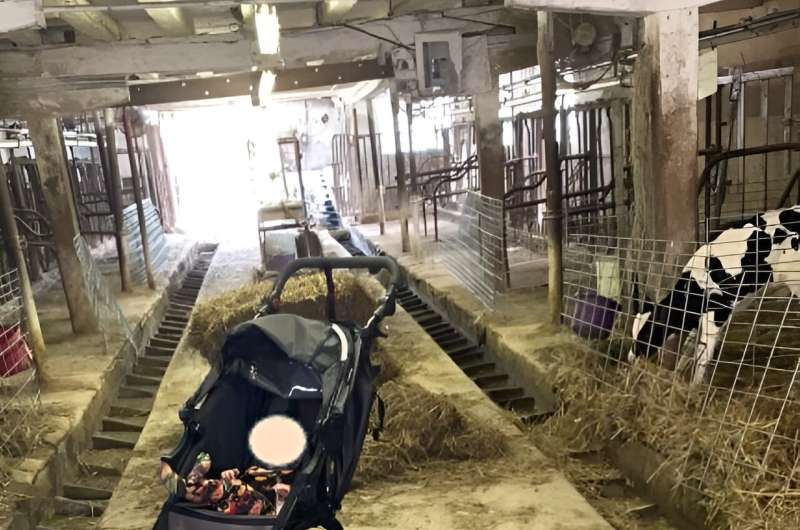This article has been reviewed according to Science X's editorial process and policies. Editors have highlighted the following attributes while ensuring the content's credibility:
fact-checked
trusted source
proofread
Farm families' childcare challenges impacting farm businesses, research suggests

Childcare challenges might not be the first thing that comes to mind when thinking about farm business viability, yet according to a new study led by a Penn State researcher, childcare challenges can negatively impact farm businesses and the farm family.
The research—a collaboration between Florence Becot, Nationwide Insurance Early Career Professor in Penn State's College of Agricultural Sciences, and Shoshanah Inwood, associate professor of community, food, and economic development at Ohio State University—focused on understanding how children and their needs shape the farm enterprise.
To assess the extent to which childcare arrangements, farm individuals and households, and farm enterprise characteristics interact, the researchers compiled and administered a comprehensive survey and analyzed responses from 729 U.S. farm families. They recently reported their findings in Agriculture and Human Values.
"Over three quarters of farm families with children under 18 had experienced childcare challenges, largely due to cost and availability, which means that they often must cobble together multiple paid and unpaid childcare options," Becot said.
"When childcare has been discussed in agriculture before, it has most often been done from a farm-safety standpoint, because children on the farm are exposed to higher rates of injuries and fatalities compared to children in the general population. But this new study suggests that childcare challenges also frequently impact farm business decisions."
In the study, 78% of respondents made changes to balance the needs of children with farm business responsibility, significantly impacting farm productivity by reducing hours worked on the farm and shifting work schedules. Respondents indicated childcare decisions also affected the structure of labor on—and off—the farm, including stopping or reducing hours worked in an off-farm job, and hiring help on the farm or in the house. Arranging and paying for childcare also influenced the farm enterprise structure, by necessitating changes in production systems and marketing channels, and influencing farm investment decisions.

These impacts likely have short- and long-term consequences on the trajectory of the farm enterprise and well-being of the household, the researchers noted. Different decisions required trade-offs that farm family respondents indicated were shaped by access to a support system, access to financial resources and specific needs of the children.
Lastly, the researchers reported, decisions faced by many farm households hint at the pervasiveness of farm parents needing to constantly adapt amidst high rates of childcare challenges and inadequate rural social safety nets. Farm parents are often squeezed by difficult choices, Becot explained.
"If they can't bring the children along while working or arrange for someone to look after them, do they curtail how much they work on the farm, reducing their business's productivity?" Becot asked.
"If family and friends are not available to help with childcare, does the cost of childcare limit household expenses and farm investments? Or do they quit their off-farm jobs to have more time to look after the children?"
But often those off-farm jobs are extremely important, Becot said, because they provide access to not just income but valuable health insurance.
"We could think that these decisions have only short-term effects, but that's likely not the case," she said. "If we think about farm investments, for example, there is a compounding effect over time of forgone or delayed investments that might have helped grow the farm enterprise or made it more efficient."
The study's findings bring up questions about how the agricultural sector has traditionally been supported, the researchers contended. While it is important to support farmers' access to land, capital and new knowledge, the researchers said this study indicates that it is equally important to ensure that farm families have the resources they need to meet their social and economic needs such as childcare.
"Childcare access and affordability are challenges across the country, but the implication here is that childcare not only impacts farm success for the families, but food availability for all," Becot said. "What this means is that the ability of farm families to meet their social economic needs must be systematically incorporated in conversations around the future of our food system and its resilience."
Previous research conducted by Becot and Inwood already has informed on national conversations about childcare. Since 2020, they have briefed senators and representatives and participated in a congressional hearing, and they have shared their findings with farm organizations. Their work has helped to influence both the U.S. Farm Bureau and the National Farmers Union to add affordable childcare in rural areas to their priorities for the Farm Bill.
The 2018 Farm Bill, currently under discussion in the U.S. House of Representatives, which was extended until Sept 30, includes the addition of childcare through the rural development program.
More information: Florence A. Becot et al, Children needs and childcare: an illustration of how underappreciated social and economic needs shape the farm enterprise, Agriculture and Human Values (2024). DOI: 10.1007/s10460-024-10594-z
Provided by Pennsylvania State University



















